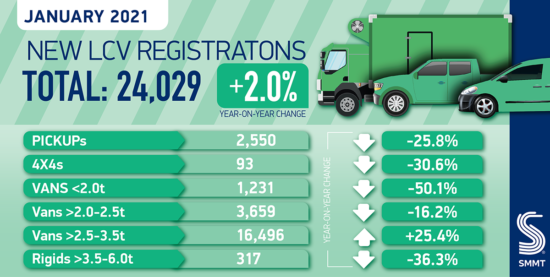January UK van registrations rise two per cent

The UK new light commercial vehicle (LCV) market enjoyed growth in the first month of the year, according to the latest figures from the Society of Motor Manufacturers and Traders. Registrations rose 2.0 per cent in January with 24,029 of the latest, low emission vehicles hitting UK roads as new models and deals drove fleet renewal. Although the fluctuating nature of fleet renewal often impacts the first month of the year in particular, 2021 opened with the highest volume January since 1990, 10.5 per cent ahead of five-year average.
Although growth is expected for the LCV sector in 2021, SMMT’s latest market outlook has been downgraded to reflect ongoing challenges. The forecast predicts LCV registrations to rise 17.5 per cent to 343,850 by year end, down from earlier predictions of 375,000 vehicles.
While nearly all van segments experienced a decline, larger vans weighing more than 2.5-3.5 tonnes saw 25.4 per cent growth, which drove overall monthly figures out of the red. Conversely, registrations of small vans weighing less than or equal to 2.0 tonnes halved (-50.1 per cent), the market for medium vans weighing more than 2.0-2.5 tonnes declined by -16.2 per cent and demand for new pickups and 4x4s fell by -25.8 per cent and -30.6 per cent respectively.
Latest SMMT analysis reveals that 2020 recorded the lowest figure for average CO2 emissions derived from LCVs, down -1.8 per cent on 2019 to 162.8g/km. January 2021 saw a rise of low emission LCVs, with battery electric vehicle (BEV) market share rising to 2.22 per cent with 533 battery plug-in vans joining UK roads. Meanwhile, 96.4 per cent of all new vehicles registered are powered by diesel, with fleet renewal to the latest Euro standard technologies crucial for a sustainable transition for the sector. As CO2 emissions targets shift from EU-wide to UK-only from 2021 and demand for heavier vehicles continues to grow, reaching net zero ambitions will depend on creating the right conditions to boost operator confidence.
Said SMMT chief executive Mike Hawes: “January’s figures are welcome news, particularly after the difficult past year. Although one month’s performance does not full recovery make, the future must involve measures that can deliver long-term changes for the sector if we are to meet ambitious targets and address both climate change and air quality goals. “The fastest way to do this is by encouraging uptake of the latest low emission vehicles, regardless of fuel type, and business confidence remains vital for this transition.”



Comments